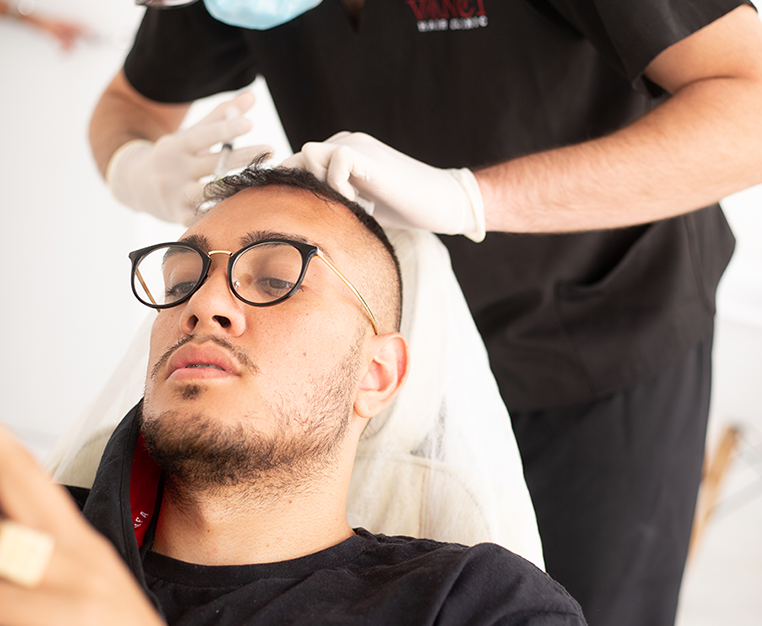We all have our favourites when it comes to hair care products. Perhaps you love your current shampoo and conditioner just because of the way it smells. However, how often do you thouroughly look at the label and read through the ingredients list? Do you know what’s in the bottle? A variety of everyday threats can lead to hair loss. Even the ingredients in the products you use daily have the potential to result in a vicious cycle of hair damage accelerating hair loss. We’ve written this blog post so that you can learn about the two common ingredients found in hair products today that could be a factor in hair damage.
Silicones In Hair Care Products
There is no denying the fact that advances in hair care and styling industry wouldn’t have taken place without the discovery of silicon. Hair serums, shampoos, conditioners, and hairsprays all contain some form of silicon which helps them retain moisture and give shine to your hair. Silicones have had some bad press in recent years, and so this part of the article will help set the record straight.
Not All Silicones Are Bad For Your Hair
Silicones are human-made polymers which are hydrophobic, that means they repel water and help make hair products waterproof. Lipstick and foundation products also contain silicones which help prevent them from drying out. Examples of the most common types of silicones used in hair care products are as follows:
- Cyclomethicone.
- Amodimethicone.
- Dimethicone.
These silicones are less sticky, lighter and thinner than other types which makes them perfect for the protective role they play in hair care. They work by creating a shield around the hair shaft, protecting it from harmful elements.
Things go wrong when manufacturers use the wrong type of silicon in their products. These silicons are thick, sticky and will form a ‘plastic’ layer around the hair shaft over time. A build-up of silicones on the scalp clogs up the scalp, eventually weakening the hair follicles. Always check product labels for ingredients such as Cetearyl Methicone, Cetyl Dimethicone, Cyclopentasiloxane, Stearyl Dimethicone, Methicone and Trisiloxane.
Are Sulphates Really That Bad?
The next ingredient you should watch out for are sulphates. As much as sulphates are necessary for keeping your hair clean, they can often do some damage too. So what do sulphates do? They belong to a group of products known as surfactants, which includes detergents, emulsifiers, and foaming agents. Sulphates are responsible for producing the foam in shampoos and conditioners. They breakdown grime, dead skin cells and silicones and allow them to wash off your hair and scalp. At their basic, sulphates are harsh detergents useful for removing polymers and silicones from your hair, but equally capable of attacking your hair’s cuticle. Weakness in the outer layer leaves your hair unprotected and susceptible to damage.
The downside of using sulphates in your hair is the fact that they strip natural oils from your hair and scalp. This will leave your hair brittle and sensitise your scalp, which can cause irritation, itching and dryness. Over 90% of shampoos on the market contain Sodium Lauryl Sulphate, and other examples include Alkylbenzene Sulfonate and Ammonium Laureth Sulphate.
Choosing Sulphate-Free Products
There are milder versions of sulphates. For example, ammonium sulphates are milder in comparison to sodium sulphates. If you find you’re having trouble with a particular shampoo or conditioner, check the label and see if you could swap to a milder form of sulphate.
Switching to sulphate-free hair products may be a better option, especially if you colour your hair or you have kinky hair. Sulphates are aggressive and will strip the colour from your hair.
Giving up sulphates and choosing sulphate-free products is great for kinky hair because you can maintain natural hair and scalp oils better. Natural hair oils help to lock in the moisture, thereby taming the frizz. A great alternative to sulphates is an ingredient called cocobetaines which is a surfactant from coconut oil. It is milder than most sulphates and an ideal choice if you want to lock in moisture in your dry, curly hair.
Are You Worried About Hair Loss?
If after swapping to sulphate-free hair products and you’re still experiencing hair trouble, perhaps there is a different underlying cause. Although sulphate-free and silicon-free products are generally better for hair care, it all comes down to your hair type at the end of the day. For example, if you have very oily hair, you may need the sulphates to break down the excess oils and clean your scalp when you shampoo.
Vinci Hair Clinic has hair restoration experts waiting to help answer your questions when it comes to hair loss. Book yourself a free consultation and take the first step to understand what is going on with your hair.




